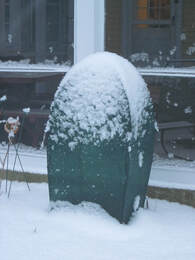AuthorLyn Chimera is a Master Gardener, consultant and lecturer. Archives
May 2023
Categories |
Back to Blog
Winter Protection12/11/2021  By: Lyn Chimera Winter means it’s time to protect your garden for the upcoming season. Whether you have critter problems or are protecting your plants against the harsh weather conditions, a little effort now can make the difference between a healthy or dead plant come spring. A big issue is critter control. Damage from deer, rabbits and mice can be devastating to many shrubs and trees. Your yard may wind up looking like a fortress, but preventative measures really work! First let’s look at deer protection:
Next on the damage control list are rabbits and mice.
General winterizing:
One last thought...Leaves are a wonderful resource. Please don’t waste them. There are lots of ways to use nature’s leaf bounty:
It all sounds like a lot of work, but it’s well worth it in the long run! HAPPY GARDENING! Lyn Chimera Lessons From Nature 716-652-2432 [email protected]
0 Comments
Read More
Back to Blog
December 2021 Gardening Tips12/1/2021
*|MC_PREVIEW_TEXT|*
|

 RSS Feed
RSS Feed


